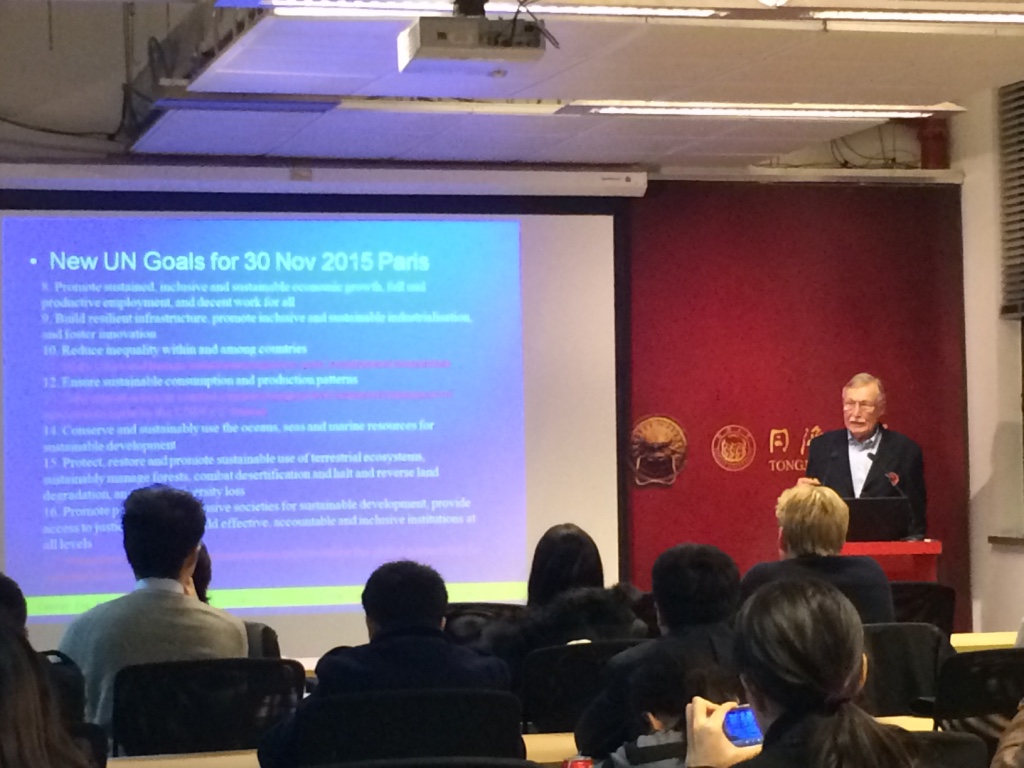卡耐基梅陇大学Prof.Volker Hartkopt教授访问同济
11月26日,来自美国卡耐基梅陇大学的Prof.Volker Hartkopt 来到同济,为学子带来“Campuses as LivingLaboratories 校园:有生命的实验室”讲座。许多生动的例子获得满堂博彩。课后,Volker教授受吴校长之邀,加入中德未来城市联盟。
吴校长首先介绍了校园人均用电量远高于市民用电量的现状,以指出校园节能的重要性和迫切性。随后,他向同学们介绍了我校在2006年对文远楼进行内部节能改造的情况,在26项技术中,吴校长着重介绍了地源热泵和围护结构在改善建筑能效方面的突出作用。也如本次讲座的题目“校园:有生命的实验室”所述,同济建筑节能改造的尝试,成为上海高校推进可持续发展的杰出范例。
Volker 教授介绍了卡内基梅隆大学的历史,并提出联合国巴黎气候变化会议的新愿景将成为高校发展和未来城市建设的重要目标。具体来说,可持续发展的能源战略可以在城市规划、就业、社区文化方面做出贡献,是值得为之努力的方向。Volker教授介绍了目前建筑能耗高企的严峻情况。根据统计,仅在水资源方面,美国建筑冷却塔用水量已经接近农业用水量,而水中蕴含内能的四分之三都白白流失,这不仅增加能源消耗,更增加碳排放。而从能源结构上看,清洁能源的运用还远远不够。
匹兹堡市一直致力于进行可持续发展的改造,Volker教授介绍了卡内基梅陇大学在这方面的引领作用。如今的匹兹堡吸引了大量的新兴产业,这不仅补充了因钢铁业萧条失去的就业岗位,更为成为新匹兹堡独特的城市特色。而在德国,大众汽车通过推进汽车拆解回收,进一步改进汽车设计,提高了汽车的组装生产效率。 在上海、斯图加特、圣保罗,可持续发展的理念和建筑节能技术都在切实改变人们的生活。
校园是推广可持续发展理念 的重要平台,也是培养下一代可持续发展人才,孕育可持续发展技术的实验室。
Prof. Volker Hartkopf from Carnegie Mellon University visited Tongji University
On Thursday 26 November 2015, Prof. Volker Hartkopf from Carnegie Mellon University - USA gave a public lecture about “Campus as a living lab”. During the lecture, Prof. Hartkopf gave numerous attracting examples. After class, President Wu invited Prof. Volker to join Sino-German Urban Future Alliance.
President Wu first explained the situation that power consumption per student on campus is much more than citizens’ average consumption in order to point out the importance of energy-saving on campus. He introduced to students the interior decoration of Wenyuan building in 2006 and its energy-saving functions. Among 26 specific techniques, he underlined most the ground source heat pump and envelop enclosure. As the theme of lecture was to describe a “Campus as a living lab,” the practice that Tongji University has made would be an outstanding example for other universities in Shanghai.
Prof. Volker introduced the history of Carnegie Mellon University. He also mentioned that new objectives proposed in UN Paris climate change conference will be principles for the development of both university and future cities. To be more specific, energy strategy indicates to contribute to urban planning, employment and community culture. Prof. Volker explained the serious situation in high energy-consuming buildings. As statistics have shown, American cooling towers in the buildings have used as much water as the volume used in the agriculture. ¾ of the water are wasted. Therefore, it gave more pressure in energy-consuming and carbon emission. It is obvious that the usage of clear energy is far from satisfaction in energy structure.
Pittsburgh is committed to developing in a sustainable way. Prof. Volker introduced the efforts that Carnegie Mellon University has made in this aspect. Today, Pittsburgh has become an ideal destination for many new industries. In this way, people can regain their working opportunity if they lost jobs because of the depression in the steel industry. This exiting phenomenon also became a great characteristic in the city. In Germany, Volkswagen used recycling process to design better cars and raise the efficiency in assembly. Sustainability and energy-saving technology are changing people’s life in Shanghai, Stuttgart and Sao Paulo City.
Campus can be an essential platform to promote the sustainability and foster talents in this field. It is possible to set up more labs on sustainable development.


